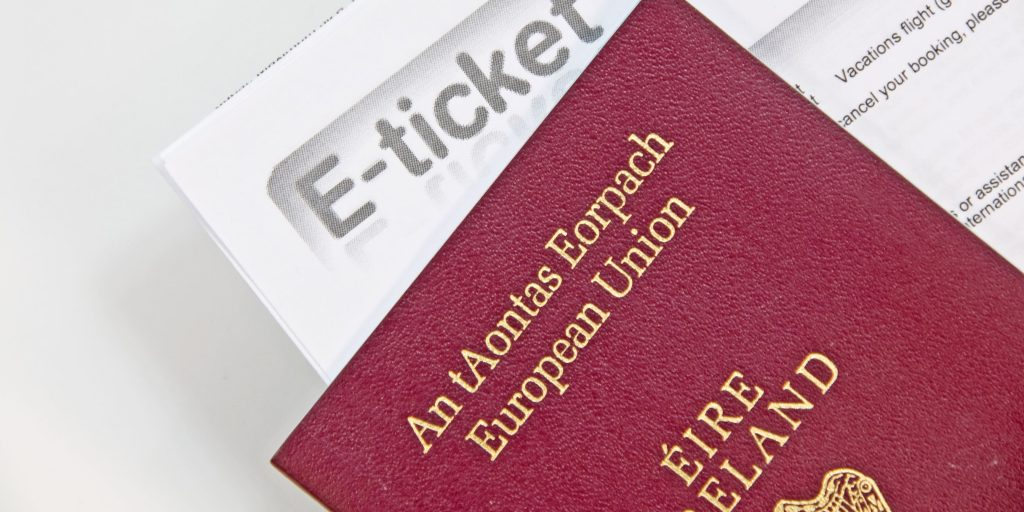The new India is the digital India, where information theft will be the most difficult. To meet the growth factor, the Government of India collaborated with the Passport Authority of India, the Ministry of External Affairs, and India Security Press to develop the country’s first e-passports.
The introduction of the new passports will make it easier for the government and residents to communicate when traveling. It will also enable citizens skip huge lines and get their passports scanned quickly.
Learn how the new e-passport program will be implemented, its debut date, application stages, the e-passport application form, benefits, features, and more in detail in this article.

What exactly is an E-Passport?

E-passports are biometric chip-based passports that may be used at automated e-passport check points. The biometric data on the digital passport include the passport holder’s date of birth, name, and other vital information on the chip. The passport’s increased security feature will aid in the prevention of fraud.
The data stored on the chip will be digitally signed. As a result, the passport authority will notice any data theft, authentication, or manipulation with the details.
In cooperation with authorities from the External Affairs Ministry and India Security Press, IIT Kanpur and the National Informatics Centre (NIC) have been creating software for the e-passport check. The new digital passport has a greater degree of security and better quality documents with high-quality printing. In India, the Finance Ministry will shortly deploy chip-based passports. The Indian Security Press (ISP), Nashik, has been awarded permission to obtain the electronic recognition inlays required to make e-passports compatible with the International Civil Aviation Organization.
The Advantages of an E-Passport
The benefits of the new digital passports for Indian people are as follows:
- Citizens will save time instead of standing in long lines to have their passports scanned and checked because they will be scanned quickly now.
- The E-passport will have a few security elements that will make this document safe and secure.
- The security elements will also help to prevent fraud and other forms of document abuse.
- The data that is kept with the digital passport cannot be erased afterwards.
- If the chip within the e-passport is broken, it will cause problems with information authentication.
E-Passport Features
With the introduction of e-passports in India, people are provided with a slew of benefits, including the following:
The passport’s memory chip will have a capacity of 64 kilobytes.
The chip contains information on the cardholders’ fingerprints and photographs.
The e-passport will also have holographic pictures that may change colors when exposed to light.
Citizens’ biometric information will likewise be etched on the e-passports.
Individual demographic information will also be included in e-passports.
Passport holders‘ iris scans will be taken to assure the document’s maximum security.
Other information included in the e-passports includes colored photos and digital signatures.
E-Passports are now available in India
The contract to acquire digital contactless inlays has already been granted to India Security Press, Nashik. This complies with International Civil Aviation Organization regulations as well as the operating system required for chip-enabled e-Passports.
Digital passports will be provided after the ISP has concluded Nashik’s procurement procedure. TCS, as the provider of e-technology passports, will also announce its launch in the last months of 2022 or the first few months of 2023. Other sovereign functions, such as providing passport booklets, will remain in the hands of the government.
Who Qualifies for an E-Passport?
The Passport Authority and the Government of India have not established the qualifying requirements for e-passports, and all Indian nationals are entitled to receive a digital passport. Citizens can update their conventional passports to the new ones by completing e-passport forms.
E-Passport Documents Required
It is critical to present a few papers to the authorities for successful application submission and approval when applying for an e-passport. The following papers are necessary to complete the e-passport form:
Address proof may be found in utility bills, Aadhaar cards, bank passbooks, PAN cards, and other documents.
Birth Certificate, Voter ID Card, eaadhaar Card, Matriculation Certificate, Driving Licence, and other forms of proof of birth date are acceptable.
If the e-passport form is for passport re-issuance, the bearer must send their original passport, a copy of the initial and last pages of their passport, ECR/Non-ECR pages, and observation pages.
What is biometric data and how will it be used in an e-passport?
Biometrics is a statistic that connects specific bodily features. Using eyeball, fingerprint, and facial scans ensures that the data is unique, which is required. The disadvantage of e-passports is that their physical traits cannot be compared to those of other persons anywhere in the globe. Cell phones with fingerprint and face recognition features are one digital device that embraces this technology. The idea is to include the greatest artificial intelligence into passports in order to make travel easier.
According to the most current e-passport India news updates, your fingerprint will be a critical biometric element. Your Aadhaar number and current passport information are already in the government database, serving as digital fingerprints. Encoding this data in an e-passport through some form of chip will make it easier to compare and authenticate a person’s identify, especially at the immigration counter.

